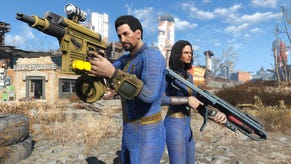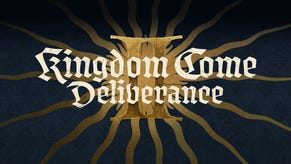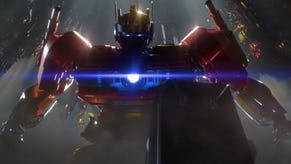Dishonored interview: who do you want to be today?
Dishonored's creative director Raf Colantonio tells VG247's Dave Cook about the dangers of launching a new IP, and why his team at Arkane is confident in the game's success.
Based in Lyon, France, Arkane doesn't have a sprawling work history, but previous releases Dark Messiah of Might and Magic and Arx Fatalis share many traits with Dishonored. At the top of the pile is freedom - freedom to explore, experiment and to express yourself in ways many games say you can't.
Before speaking with Colantonio we had a chance to play Dishonored's Lady Boyle mission. The stage embodies the level of freedom Arkane wants to empower players with throughout the game.
So let's hear from Raf Colantonio, a man who wants Dishonored to ask, 'Who do you want to be today?'
VG247: Dishonored is a new IP, and that can be a difficult thing to sell can't it?
Raf Colantonio: Yeah totally. We're still very excited, but that feeling is unverified because the game is not out yet. It's almost ready, people love the game so far and hopefully feel that it's as good as we think it is.
You feel confident in it and Bethesda clearly feels confident in it. Let's go back to the start though: How strongly did you have to pitch the concept of Dishonored to Bethesda before you started working together?
It was a little bit of a fairy tale because back then Bethesda actually approached us. They had a very precise idea in that they wanted a game similar to what Arkane had done in the past, but done for them. They wanted it to be an assassin game that was also something new.
From there they let us do whatever we wanted and we said, 's**t yeah, that's awesome, why haven't we hooked up before? [laughs].
Arkane does have a lot of great talent though, including Half-Life 2 concept artist Viktor Antonov. How did that pairing come about?
We were working with Valve - even during Dark Messiah - and we had their engine, the Source engine. That's when we first met Viktor Antonov and we worked on a few creative things over time. He wanted to move back to France, so working with us was sort of a natural move.
Together you have created a strong setting in Dunwall. Why did you decide to focus on the city's class divide as a core theme?
There is a contrast between the rich and the poor in a context of the plague, disease and oppression under a dictator. So everybody is afraid, and so in the Lady Boyle mission you played earlier, there is a sombre mood, but at the same time it's meant to be a party.
The atmosphere is very weird - kind of like cynical and sad in a way - and that's kind of representative of the full game.
Even though there is a class divide, it also feels like a human story. It's not good versus evil, or as black and white as that. Some of the rich people at the party, you actually felt sorry for. They're not bad people, they just happen to have more money
Well, some of them are bad people, but the story is that you were the bodyguard of the empress who has become framed for her murder. You are wrongly accused and then sent to jail. The one who did that is the Lord Regent who is the ruler of the country.
The lord has some ties with the aristocrats who are throwing this party, so when you go there, not all of them are bad. The one that you need to kill - Lady Boyle - is actually the mistress of the Lord Regent.
The twist at the end of the Lady Boyle mission - which we won't spoil - is morally very grey and leaves you feeling a little conflicted. Was that a clear aim, rather than just going for two obvious moral paths?
We're obsessed with simulation, choice and player's emotions. I think that nothing is really black and white in the real world, and when you play games it's a way to travel into a different world and be a different person. You can experience things that you can't in every day life and so on.
For us, the more immersive we can make it, or the closer you can get to another place where you feel like you're there - that's important for us. That's why we do things that present greys of morality rather than saying, 'Hey, just go there and shoot everybody.'
That's another topic altogether isn't it? - that so many games do approach morality as a straight, two sided issue. Dishonored gives much more freedom than that, even in gameplay and the way you approach Corvo's objectives. Is that freedom lacking in the industry?
For me as a gamer yes [laughs]. I don't know, I mean like, I think a lot of people at Arkane do love games that liberate and let you explore and experiment with systems. That's better than moving down a line and just shooting things that are coming at you.
But that's OK, and I understand why the industry does that in a way. It's so hard to make games, and people want to invest their dollars in the things that are the most impactful, and put all of their dollars in special effects - it's a circus - that's why people do it.
I understand that, but from a gamer's perspective it sucks, but it's cool because sometimes you want to play something like that and just sit there. But at the same time I don't want to only do that, you know?
Gaming is a powerful medium and you can see that in Dishonored's artistry and sense of place. If you consider a game to be a blank canvas, do you feel the corridor approach is a waste of that potential?
Yeah I mean we don't necessarily try to give a message so much, but I definitely want to engage the player's emotion and let them express themselves. It's more about the player than us really, and I think players recognise that. I've heard a few players say that of our previous game, like 'to me it felt real, like a place with identification. A very real place.'
That was a really nice feeling that they said that, because it wasn't a corridor where everything feels fake and you never look behind or explore, or you just keep on moving forward and everyone's faking it. Those games are a show, you know, but occasionally I like that.
Dishonored does have a sense of place though, like the big environments of our day - City 17 Rapture, and so on. That must have been a difficult feeling to establish. Was the world always the same as it exists now.
No, it was very iterative. The infrastructure and the initial map of the world was done very quickly, and then one the map was done they cut it up so they knew that mission two is here, mission three is there.
Viktor Antonov and the art director were methodical about these things and very structured. But yeah it took forever - mostly the style during pre-production - but even as the game was being made we kept on adding and adding and refining. So yeah, it's been a long and complex process.
The character Corvo is interesting as well because he has minimal dialogue. Why was that approach important to you in a game where so many people talk?
You know, we could have gone either way. I think in the past we went a different way but this time we wanted to explore how it would be for the player and the character to be one, and removing as much of his personality as possible was the direction we chose.
Even though he doesn't have a voice, to what extent will we see Corvo develop through the story?
It's really about what you do - if you want to play lethally or non-lethally, how you use your powers and how you use your equipment. So it's really more about you, and whenever there is dialogue he says things that are slightly tonal, but it's very light so there's a lot of space to project yourself on him.
Non-lethally is important as there's not a lot of stealth games out there at the moment, especially not as open as this. Is this a genre you'd like to see return in force, and why do you feel it has fallen by the wayside in recent years?
The funny thing is that we do consider that Dishonored is a stealth game because stealth is very important, but it's not enforced. You could totally play without stealth and that's important to us because it's not like you play a mission, and then as soon as you get discovered you fail the mission.
For us the stealth element should be in every game as part of the simulation. If you play like Far Cry 3 or S.T.A.L.K.E.R. you know - any game that gives a sense of simulation - I think stealth should be in their systems.
And that is absolutely your choice, to be stealthy or to be aggressive. Why was this vital to Dishonored's gameplay?
It all goes back to player expression, morality and to give the player a chance to use their own play style. Replayability is party of it too, and so I think that's important because a lot of people like to be good when you give them the choice.
Look at the games that don't give you a choice, the ones that ask you to just kill everyone in a variety of ways. But when you look at the games that give you choice, the fact that there is a possibility not to kill makes killing that little bit more impactful in this case, because you have made the choice to kill. Death has more weight.
So those deaths aren't necessary
They aren't necessary, yeah. So if you look at this approach in both ways, whatever you do has a little ore weight.
What player incentives are there for taking a completely passive approach throughout Dishonored?
There are a few things, like the obvious achievement. But there is also the fact that if you don't kill anyone, or keep kills low, the ending of the game will be brighter.
Can you tell us how many endings there?
There are three main endings and variations of them based on your performance, as this was to reflect the personal choice of the player.
Let's go back to Dishonored as a new IP. You don't start something this ambitious and grand without seeing future potential in it. Without prying into the possibility of a Dishonored sequel, what other broad areas of development would you like to explore in future?
Personally I am very happy with the reaction we are getting right now, and if you look at all of the games we have worked on, they are always on the same axis of RPG and FPS. I want to stay somewhere in that area.
Personally I would like to explore more of the RPG side, back to the start of Arkane Studios, but this mix of RPG and FPS is really what I like.
Similar to first-person RPGs like Elder Scrolls?
Yeah Elder Scrolls, I really like that game and the team at Bethesda. I don't play many games in a year, but I know that whenever there is a Bethesda game that comes out, I'm going to enjoy it.
Dishonored launches on PC, PS3 and Xbox 360 in Europe on October 12th




.jpg?width=291&height=164&fit=crop&quality=80&format=jpg&auto=webp)





